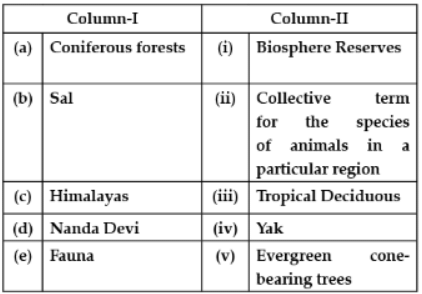Test: Natural Vegetation and Wildlife (Term II) - Class 9 MCQ
10 Questions MCQ Test - Test: Natural Vegetation and Wildlife (Term II)
Assertion (A) : India’s natural vegetation has undergone many changes recently.
Reason (R) : Climatic factors include temperature, humidity in air, precipitation and soil available in the different parts of the country.
Assertion (A) : Evergreen forests are found in the Western Ghats, Lakshadweep Islands, Andaman and Nicobar Islands, upper parts of Assam and on the Tamil Nadu coast.
Reason (R) : As the region is warm and wet throughout the year, it has a luxuriant vegetation of all kinds – trees, shrubs and creepers giving it a multilayered structure.
State whether True or False :
Montane forests are found in coastal regions.
State whether True or False :
Tropical evergreen forests are characterised by cold climate.
The ____________ forests are usually found in coastal areas.
_______ forests are also known as tropical deciduous forests.
State whether True or False :
Biodiversity is influenced by climate in a region.
State whether True or False :
Dry Deciduous provides valuable timber.
Orchids are an example of ______ plants.




















